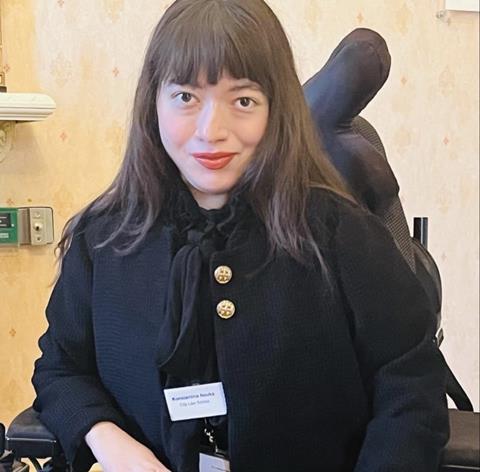An aspiring criminal law barrister has launched a court accessibility survey in a bid to create an accessibility map for legal professionals and court users.
Konstantina Nouka, who was diagnosed with Ulrich muscular dystrophy and uses a wheelchair, founded Bringing [Dis]Ability to the Bar (BDABar) in 2021 after her own ‘unfortunate’ experiences when trying to apply for mini-pupillage.

Nouka, who hopes to start pupillage at Nexus Chambers later this year, said: ‘I got a lot of questions about “how will you visit clients in prison” because I want to go into criminal law, “will you be able to work extensive hours that the bar requires”. It felt your ability was overshadowed by your disability.
‘People with a disability are utterly unrepresented [in the legal profession and judiciary]. We want to make the profession more inclusive. We understand that the problem is lack of knowledge.’
To improve accessibility, BDABar is collating data on court accessibility by asking legal professionals to fill out a short survey. Courts and tribunals are also being contacted for information.
Nouka said limited information on court accessibility meant she had to contact the court beforehand to check she would be able to access it.
She said: ‘One of the big struggles for me and my chambers is where shall they send me, to which court. There is limited information available [about accessibility].’
Nouka told the Gazette how, in her experience, though some Crown courts list basic accessibility information, the court’s information page online ‘does not tell you which courtrooms are accessible or the measurements of the lift, it does not tell you where listings is or which floor it is on, or where the robing room is, or the café, or are the benches movable for a wheelchair to go and sit in court’.
She added: ‘Currently, we are emailing individual courts to have to try and find out this information. I am less stressed about doing the pupillage and more stressed about possibly having to speak in a corridor [if unable to get into court].’
A Law Society report from 2022 asked 500 solicitors about their experience in courts and tribunals which found disabled respondents were more likely to feel the court’s physical building (37%) or the technology provided (27%) were not fit for purpose, compared to those without a disability (28% and 21% respectively).
![Nouka founded Bringing [Dis]Ability to the Bar in 2021](https://d1d8vslyhr7rdg.cloudfront.net/Pictures/480xAny/5/4/9/115549_img_0036_989652_crop.jpg)
Law Society president Nick Emmerson said: ‘Our research has found that disabled court users are even less likely to feel physically secure or safe from harm while attending court. Our members have told us that the technology access for disabled people is limited, with tribunals rarely able to provide recordings or transcripts.
‘First-hand experience from court users also identified areas that are lacking, including HM Courts & Tribunals Service needing to improve the court estate for disabled people by installing lifts, ramps and private meeting rooms.
‘The UK government must collect better data and evidence to address these inequalities – both ensuring physical access to buildings and protection for those using the court estate – and developing services to ensure access to justice.
‘We hope this government can look more closely at improving the court estate for all disabled court users.’
The data collected by BDABar on the extent and effectiveness of accessibility measures in court will be used to create a disability map with accessibility information including the number of accessible courts, if court benches are moveable, if listings and robing rooms can be accessed, and lift measurements.
BDABar will also prepare a report and recommendations of what can be improved.
To complete the survey, click here.
This article is now closed for comment.



























7 Readers' comments